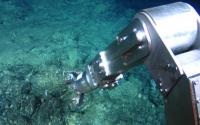Marine Conservation

Marine conservation, also known as marine resources conservation, is the protection and preservation of ecosystems in oceans and seas. Marine conservation focuses on limiting human-caused damage to marine ecosystems, and on restoring damaged marine ecosystems. Marine conservation also focuses on preserving vulnerable marine species.
Quicktabs: Keywords

Today President Obama announced plans to expand the boundaries of the Pacific Remote Islands Marine National Monument, a marine reserve created by George W. Bush in 2009. The final perimeter has not yet been determined, but maritime law allows the U.S. to control up to 200 nautical miles away from the shore.
[ More ]
A U.N. working group is discussing a proposed "international mechanism" for the protection of oceans. Any such treaty or convention will be a new implementing agreement under the 1994 U.N. Convention on the Law of the Sea (UNCLOS).
[ More ]
The prospect of a race to the bottom of the ocean – a 21st-century high seas version of the Klondike gold rush – has alarmed scientists. The oceans, which make up 45% of the world’s surface, are already degraded by overfishing, industrial waste, plastic debris and climate change, which is altering their chemistry. Now comes a new extractive industry – and scientists say governments are not prepared.
[ More ]
A new international agreement is needed to police the exploitation of the deep ocean because of the rising threats of deep-sea mining and bottom trawling for fish, say scientists. Speakers at a symposium this month (16 February) urged the UN to negotiate a new treaty for the deep ocean to supplement the UN Convention on the Law of the Sea.
[ More ]
US secretary of state John Kerry called for expanding the world’s marine reserves by a factor of 10 on Tuesday, signalling a bolder new US approach to international environmental protection.
[ More ]
Deep-sea mining is floundering. The leading company in the race to mine the ocean floor has fallen out with its host government, while other projects have been delayed until the environmental effects are better understood.
[ More ]
The last great unexplored wilderness on Earth is about to experience industrial-scale mining that could change the face of the pristine seabed of the deep ocean for generations to come, scientists have warned.
[ More ]
Scientists have made an impassioned plea for humanity to pause and think before making a headlong rush to exploit the deep sea. The researchers said the oceans' lowest reaches had untold riches that could benefit mankind enormously, but not if the harvesting were done destructively.
[ More ]
New interest in the exploitation of seabed minerals has led to the revival of old concerns for the preservation of our oceans, argues Michael W. Lodge, Deputy to the Secretary-General and Legal Counsel of the International Seabed Authority.
[ More ]
Leading marine biologists have joined a call to partly privatise the oceans' beleaguered biology, in the interests of effective conservation. The kill-or-cure message comes from a "blue-ribbon panel" set up by the World Bank's Global Partnership for Oceans, which aims to come up with effective ways of financing ocean protection.
[ More ]Pages
The Committee has heard from many witnesses that our failure to ratify this global treaty has hurt us to some extent economically, diplomatically and environmentally. These witnesses have rightly noted that our failure to ratify the Convention has hurt not only our international credibility, but also our ability to effect future changes in the terms and agreements upon which international law is based. The United States is a world leader in marine conservation, and our accession to UNCLOS will greatly help us advance international standards and practices.
While the United States is a world superpower, we must fully engage our fellow nations and secure the cooperation of the international community if we are to be successful in protecting our oceans and their resources. For example, currently the United States adheres to the fisheries conservation measures in the Law of the Sea and subsequent Straddling Stocks Agreement, and we treat them as customary international law. However, unless we become a signatory to the treaty, we are without recourse to enforce this Agreement’s terms with regard to other states which do not. We are also unable to fully represent U.S. interests in negotiating future changes or terms to both of these agreements. Both the Pew and the Federal Oceans Commission have recently recommended accession for this purpose: to secure a positive environmental framework for U.S. ocean management. In sum, it is impossible to be a world leader relative to the health of the oceans without full participation in the international rule of law that applies to them.
While Moore’s view is also that Article 82 is a “small quid pro quo”,11 the Article may nonetheless have undesirable consequences. For example, Rainer Lagoni observed in New Delhi in 2002 that in providing for five years where the revenue share is nil per cent before slowly climbing by one per cent a year there is an incentive of the mining industry to extract resource at a far faster rate than they might otherwise do.12 This may lead to an inefficient, even wasteful use of resource, particularly when taking into account the gearing of refinery resources to the raw resource available.
The Law of the Sea Convention provides strong protection for the marine environment. Indeed, the Rio Conference on the Environment accepted Part XII of the Convention as the core environmental provisions for the world’s oceans. Not surprisingly, American environmental groups overwhelmingly support adherence to the Convention. Indeed, in one case, that of the protection of marine mammals, the Convention embodies the initiative of a United States environmental NGO. Thus, Article 65 of the Convention on the protection of marine mammals was negotiated following important work done by the Connecticut Cetacean Society. United States influence was also felt in requirements concerning monitoring, publication of reports, and assessment of potential effects of activities. The United States was further successful in avoiding any environmental double standard in the world’s oceans.
Remarkably, the important new environmental provisions of the Convention are sufficiently balanced that they enjoy the support of all United States oceans interests. Support for this Convention is that rare public policy issue on which both industry and environmental groups strongly agree.
Rather than implement a comprehensive national plan designed to comply with the new global "legal order" establishing marine protection, the United States maintains an ad hoc approach to ocean environmental regulation. The United States reacts to specific ecological problems when drafting domestic legislation and when negotiating international agreements. Far from being comprehensive, the U.S. scheme of ocean environmental protection is "scattered," problem-specific, and often contradictory.77
The United States' desire to assert national sovereignty over the ocean space is the basis for legislation regulating the use and protection of ocean resources.78 Its refusal to cooperate with neighboring countries in negotiating ocean environmental policies and access to ocean resources stems from an unwillingness to compromise that sovereignty.79
Moreover, individual state sovereignty over coastal territory is a basic foundation of the U.S. political scheme. Additionally, "federal versus state control over the newly acquired territorial sea is one of the major controversies raised by the most recent legislative proposals."' If individual U.S. states maintain control over the territorial sea off their coasts, they will be responsible both financially and legally for pollution control and cleanup in that area. Such piecemeal regulation could result in "varying degrees of marine protection throughout the United States."81
The internal conflict over exercising state and national sovereignty in the ocean territory has taken precedence over international interests. As a result, U.S. policy is adverse to the UNCLOS mandate to harmonize resource use and conservation activities with other states to achieve uniformity in global environmental legislation.82 Moreover, when problems arise, the United States at times violates the UNCLOS spirit, and possibly its directives, by failing to cooperate with other states in addressing the problems. Rather, the United States elects to act unilaterally, thereby violating rights delegated to other states under UNCLOS.83
The U.S. government's policy of pursuing a "quick fix" to environmental issues by enacting ad hoc domestic legislation and failing to negotiate comprehensive international agreements conflicts with UNCLOS' goal of global cooperation. Moreover, the U.S. unilateral actions often encourage other states to retaliate by initiating their own trade restrictions.84 In the long run, the U.S. policy undermines UNCLOS and the goal of global coop- eration in marine resource protection.
A major source of tension between U.S. regulations and UNCLOS directives concerns the United States' imposition of unilateral trade sanctions against other states in order to enforce U.S. standards of operation. Such unilateral actions violate international law by directly interfering with a sovereign's exclusive right to regulate activities in its own territory.127 A state may trigger U.S. trade sanctions if it fails to comply with U.S. domestic conservation standards, such as the MMPA128 or the 1989 Sea Turtle Conservation Amendments to the ESA.129 As discussed above, the imposition of trade sanctions under these laws depends upon whether a foreign state implements conservation or operating standards comparable to those adopted in the United States for protecting marine mammals and sea turtles."130
The international community is hostile toward these laws because trade-sanction decisions are based solely on U.S. domestic environmental standards and contain no exceptions for internationally agreed upon standards.131 Additionally, "these statutes have been deemed protectionist by many nations because they serve to protect U.S. fishermen from foreign competition by equalizing costs associated with environmental protection."132
UNCLOS is now international law. As such, parties are bound by the obligations and duties imposed by the "constitution for the oceans." Arguably, even states that have not formally ratified the treaty are bound due to its status as customary international law.
UNCLOS requires states to cooperate globally to "protect and preserve the marine environment." As a compromise package, UNCLOS carefully balances the need for states to maintain sovereignty over their territorial waters and EEZs with the global need to manage effectively the ocean ecosystem. Because such careful balancing is necessary to preserve global harmony and provide effective resource management, the participants in UNCLOS agreed to rigid dispute settlement procedures that are both compulsory and binding.
UNCLOS resulted from a long, arduous negotiation, in which the parties present compromised on numerous policies to achieve a global balance. The United States played a major role in the negotiations and greatly influenced the resulting policies.
Since President Reagan's announcement that the United States would adhere to the terms of UNCLOS, the United States has made little change in its policy of ad hoc regulation of marine issues. As a result of its ad hoc decision-making and "knee-jerk" responses to immediately perceived problems in the ocean environment, the United States has failed to create a comprehen- sive national plan. The U.S. ocean legislation fails to balance the needs of the ocean ecosystem with the needs of U.S. commercial fisheries and, therefore, conflicts with the express provisions of UNCLOS.
Moreover, the United States explicitly violates UNCLOS by unilaterally imposing its policies on those states it can control through strong-arm trade sanctions rather than recognizing and respecting each state's sovereign right to manage its own ocean space. Rather than cooperating in compromise agreements designed to achieve a plan benefitting each country involved, the United States' first response to a state with practices different from its own is to impose trade sanctions.
To comply with international law and to achieve the vision aspired to by UNCLOS, therefore, the United States must now revisit its approach to ocean policy-making and modify it to achieve harmony and cohesion. The United States must combine the myriad of scattered, conflicting legislation into one package de- signed to manage ocean resources while considering the interde- pendence of species and habitats. The United States also must cooperate globally, rather than act unilaterally, to achieve and not impede the goal of world environmental protection.
While the United States took a leading role in creating UNCLOS, it is not one of the 165 countries that have ratified the treaty. At the Economist World Oceans Summit in February, Secretary Kerry criticized the U.S. Senate for inaction—while adding that the United States is nonetheless “committed to living by the law of the sea even though it isn’t ratified.” But there is no substitute for ratification, which would benefit the United States for a host of reasons, both practical and symbolic. One of the most important is the signal it would send to the rest of the world. In his May speech at West Point, President Obama once again called for Senate action on UNCLOS. “American influence is always stronger when we lead by example,” he explained, “we can’t exempt ourselves from the rules that apply to everybody else.”
Preventing the continued destruction of three quarters of our planet will require inspired U.S. leadership of the sort that was on display last week in Washington. The health of the ocean is essential for the survival not only of sea life, but of human life. As oceanographer Jacques Cousteau warned in 1981, “[the ocean] is man’s only hope. …we are all in the same boat.”
The Law of the Sea Convention provides a comprehensive framework for international cooperation to protect the marine environment. It imposes minimum requirements—all of which are already being met by the United States—to protect and preserve the marine environment. Under the Convention, states are required to take measures to address pollution from vessels and landbased sources, to prevent the introduction of alien or invasive species, and to conserve and manage coastal fisheries.
The Convention also requires states to work together to protect the oceans. States are required to cooperate in the management of high seas fish stocks, as well as stocks that migrate between the high seas and exclusive economic zones, setting the stage for regional agreements essential to managing ocean fisheries. States are also required to work together to protect marine mammals, which are given special protections under the Convention.
The standards for environmental protection set forth in the Convention work strongly to the advantage of the United States, which has already met and in most cases significantly exceeded these standards but necessarily depends on actions by other nations to protect the marine environment.
